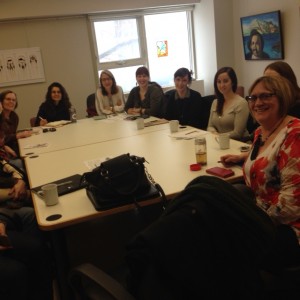Community development has always been at the core of Klinic; our very roots are steeped in community development approaches. When a community need was identified, an intervention was planned, and thus Klinic was born. Though Klinic now serves many communities, we will always identify downtown Winnipeg as our home. Several of our programs, including our primary care services, focus on this geographic community. Klinic also employs one full time community development worker, Genny, to offer services in this area. Last week I got to spend part of a day with Genny talking about her work and taking part in an important network that Klinic has been key in developing and supporting: the West Central Network (WCN).
WCN covers three neighbourhood areas: Spence, Daniel McIntyre, St. Matthews and Central Park. The membership is fluid but total membership is approximately 25 organizations. The goal of the network is to come together to share information about work and issues that are impacting the community. Today’s meeting is being held in one of my favorite places, Artbeat’s Studio Central at 444 Kennedy. It is lovely to be surrounded by this beautiful artwork as we do our round table. The meetings rotate so that different venues in the community are part of the experience.

Today there are nine organizations represented and the flow of the information sharing is very organic. Genny tells me it has changed a lot over the years as different players always bring different strength and focus. At times the network may identify a need and take on a special project. A successful previous example is working with government and funders to get a settlement worker for the area, which has a high population of newcomers.
Genny co-chairs the network with the WRHA community development person for the area. One of the members of the network is the WestEnd Commons, which seems very fitting given the role that Genny and Klinic played, and continue to play, in developing this fantastic community resource. It is no stretch to say that without Genny’s dedicated contribution to this project it likely could not have been as successful. Genny continues to act as a de facto administrator for this project as it searches for stable core funding. This is a perfect example of why Genny’s role is so pivotal. Through community development, Klinic has been able to help develop many now successful community organizations including the West Central Women’s Resource Centre and neighbourhood associations.
Partners presenting today include a variety of neighbourhood associations, non-profit housing providers, John Howard Society and of course Studio Central. The sharing includes many great new programs including a partnership by Daniel McIntyre/St. Matthew’s Community Association with Klinic to provide a safe space for sex workers every Friday night. There is a gentle teasing about how Klinic in community equals condoms to so many…
However, what really strikes me in today’s sharing is the level of democratic engagement occurring for the upcoming provincial election. Every neighbourhood association has an election forum planned with their local candidates. This really hits home for me as a pivotal role we can all play.
At Klinic promoting democratic engagement is seen as part of our role as a community health centre supporting healthy and engaged communities. Over the last year, we have been able to partner with other community health centres in Manitoba under the banner of the Manitoba Association of Community Health (MACH) to develop a framework for supporting and increasing community health. As part of our democratic engagement strategy, MACH has met with party leaders and developed a survey to assess where they stand on community health.
MACH posed three questions to the leaders of the provincial political parties and will be posting the answers on the MACH website and on Twitter (@MACHmanitoba) after April 4, 2016: www.machmb.ca
- How do you see the Community Health Centre (CHC) model of “providing the right care, by the right providers, at the right time” impacting ER wait times?
- How would you support Community Health Centres to address health equity and access in rural communities throughout Manitoba?
- How can CHC’s expertise influence policy and decision making in current and emerging healthcare issues?
I encourage you to take the time to find out what matters to you this election, and the candidates that support your goals: voting is good for your health, and your community. We also encourage you to join MACH in making community health a priority in this election. To find out more on how to do this, visit the MACH website or join the conversation by using #communityhealthmatters.

